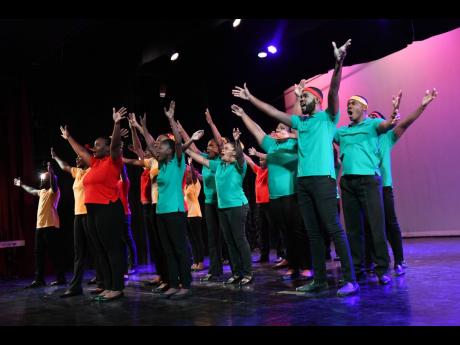An event-filled year at the UWI’s PSCCA
The academic year drawing to a close at the Philip Sherlock Centre for the Creative Arts (PSCCA) of the UWI, Mona campus has been an eventful one for acting head Michael Holgate. Opened in 1968, the centre technically marked its 50th year in 2018, but, officially, the anniversary was celebrated in the 2017-18 academic year.
Online information about the PSCCA is that it supports five clubs and societies, but the number is actually 10, and Holgate told me that the one attracting most students (who come from all the faculties and include both commuting and residential students) is the University Dance Society.
“It might initially register as many as 200 students, but that number falls as the months go by,” he said.
The other clubs/societies are the University Chorale, University Dramatic Arts Society, University Singers, Panoridim Steel Orchestra, UWI Camera Club, University Pop Society, University Writers Circle, UWI Jazz and Classical Ensemble, and Mona Campus Male Chorus.
Holgate is quite proud of the activities of the three-day production, Jamaica Dance Umbrella (JDU), which he started when he first joined the PSCCA in 2014 as assistant tutor to the head, Dr Brian Heap. It showcases items from the best dance companies in the island, including the National Dance Theatre Company, L’Acadco: A United Caribbean Dance Force, and The Company Dance Theatre, three companies which perform every year and generally are “very successful and popular with audiences”.
Holgate added that a highlight in the 2018 season was the visit by the mesmerising, internationally acclaimed Haitian dance company Ayikodans. “Passing the 10-year mark with the JDU was a particularly special moment for me,” said Holgate, “as the milestone signalled the power of community and commitment” of the dance companies in Jamaica, the region and further overseas, and to the idea of all coming together for a festival.
An event inaugurated in the anniversary year was the Research Theatre Series, said Holgate. It featured the Jamaica Youth Chorale, QUILT Performing Arts Society, the University Players and Carolyn Allen’s Off The Page group, which specialises in staging literary works.
ISSUES OF IDENTITY
Elaborating, Holgate said, “This series, titled Ancestry, highlighted research being carried out by the participating groups around issues of blackness and identity.” Those issues are among the ones Holgate tackles in what he calls his Caribbean Mythery productions, created over the last 10 years.
“They are dance and drama musicals that make use of Caribbean myths,” he said. “I also use a lot of African myth. In fact, because of who we are in the Caribbean, I take myths from everywhere; we have that right.” (Caribbean Mythery is also the subject of his soon-to-completed PhD thesis.)
Among the productions – all written, designed, choreographed and directed by the multitalented Holgate – is Glass Routes, later developed for the Ashe Company into Dead Lef, which the company will stage in Miami next month. The others are Riot Act, Garvey The Musical, Blogs and Mirrors and most recently, Seville and De Bone Tribunal. This show started life as the shorter Bone of Contention, which Holgate produced with Irvine Hall students.
Holgate created the Caribbean Mythery musicals to attract new, especially younger, audiences to the theatre. “I’ve found that young people are not necessarily interested in traditional theatre,” he explained. “In an effort to find new ways of engaging them, I use ‘edutainment’ (entertainment plus education). In my plays, I intend to inform and to educate, some might say too directly.”
After doing his research, including interviewing people and reading, he said, he builds his stories around the ideas that come up and work them into a production.
“I want to get a seemingly airy-fairy concept – like repatriation – across in a concrete way to the ordinary man, so that he understands how he is affected by it even without knowing it. If you know, you can start to take action, but when you don’t know, what can you do?
“You don’t know that you think reparation is a stupid idea because slavery was going on 400-500 years ago and you’re been told not to even think about it. You don’t know why you’re bleaching your skin; you really think your black skin is ugly. Those things bother me,” he said.

